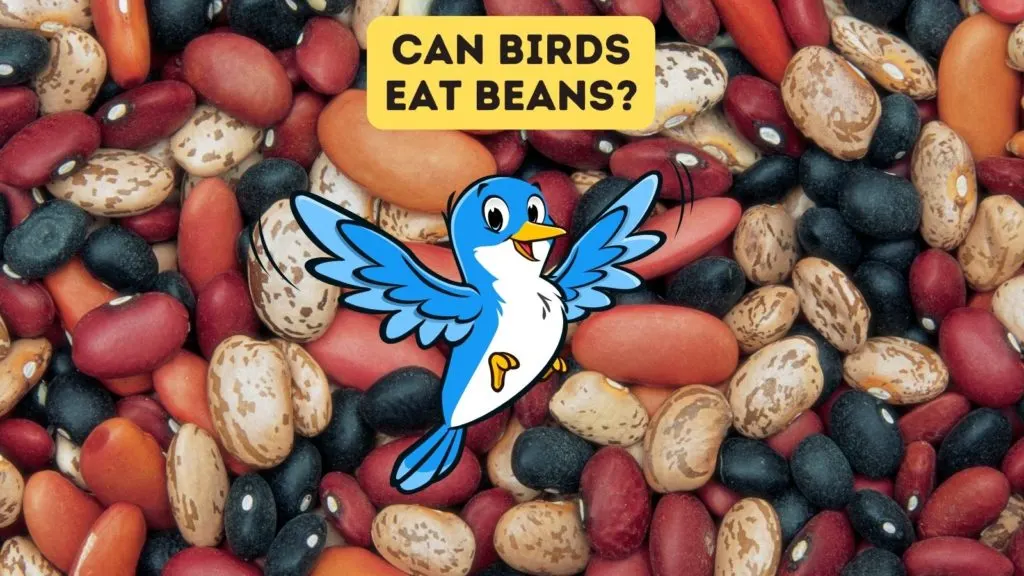Bird lovers often explore various food options to enrich the diet of their backyard birds. A common question is whether birds can eat beans. Beans, indeed, can be a nutritious addition to a bird’s diet, but there are some beans you should not feed to birds. Let’s look at the options–and which birds are mostly likely to enjoy beans at the feeder!

Types of Beans Safe for Birds
Not all beans are suitable for birds, and the way they are prepared matters. Here are some safe options:
- Cooked Black Beans: Rich in protein, but must be cooked thoroughly without any added spices or salt.
- Cooked Kidney Beans: Another protein-rich option. Raw kidney beans are toxic to birds, so ensure they are well-cooked.
- Cooked Navy Beans: These beans are a good source of minerals, but like others, should only be offered cooked.
- Chickpeas (Garbanzo Beans): Offer these either cooked or sprouted, never raw.
Which Types of Beans Should NOT Be Fed to Birds?
Certain types of beans should not be fed to birds due to potential health risks. These include:
- Raw Beans: Most raw beans contain a naturally occurring toxin called lectin, which can be harmful or even fatal to birds. This is especially true for raw red kidney beans, which have high levels of lectins.
- Canned Beans with Additives: While canned beans are cooked and safe from lectins, they often contain added salt, sugar, or other preservatives that are not healthy for birds. If using canned beans, choose those with no added salt or seasonings, and rinse them thoroughly before serving.
- Baked Beans: These are typically prepared with sauces and seasonings, including sugar, salt, and spices, which are not suitable for birds.
- Refried Beans: They often contain added fats, spices, and seasonings, making them unsuitable for birds.
- Flavored or Seasoned Beans: Any beans that have been flavored or seasoned with spices, salt, garlic, onion, or other additives should be avoided. These ingredients can be harmful to birds.
- Coffee Beans and Cocoa Beans: These contain caffeine and theobromine (a toxic substance also found in chocolate), substances that are toxic to birds.
It’s important to remember that even safe types of beans should be thoroughly cooked (without any added ingredients) before being offered to birds, as cooking neutralizes the harmful lectins. Beans should be served as part of a varied diet and not as the main food source for birds.
Which Birds Eat Beans?
Along with domesticated birds like chickens, several species of wild birds might give beans a try at the feeder.
Feeding cooked beans to wild birds is not a common practice, and most wild birds typically prefer seeds, nuts, fruits, insects, and other natural food sources. However, there are a few types of birds that might potentially eat cooked beans if they are available at a feeder, especially during harsher conditions when food is scarce. These could include:
- Pigeons and Doves: These birds are known for their adaptable diet and might eat cooked beans offered at a ground feeder.
- Crows and Ravens: These intelligent birds have diverse diets and may try cooked beans.
- Sparrows: Some sparrow species aren’t very picky about their food and might eat beans from ground feeders.
- Jays (such as Blue Jays and Stellar’s Jays): Known for their omnivorous diet, they might be willing to try cooked beans.
- Starlings: These birds have a varied diet and may eat cooked beans if other food sources are limited.
- Blackbirds (including Red-winged Blackbirds and Common Grackles): They have adaptable eating habits and might sample cooked beans.
Serving Beans to Birds
Proper preparation and serving of beans are crucial:
- Always Cook Beans: Raw beans, especially red kidney beans, contain toxins harmful to birds.
- Avoid Seasonings: Cook beans without salt, spices, or any additives.
- Cool Before Serving: Ensure the beans are at room temperature before offering them to birds.
- Offer in Moderation: Beans should only be a small part of a bird’s diet.
Nutritional Benefits of Beans for Birds
Beans offer several health benefits to birds:
- High in Protein: Essential for muscle and feather development.
- Fiber: Aids in digestion and gut health.
- Vitamins and Minerals: Beans are a good source of various nutrients like iron and magnesium.
In summary, beans can be a healthy and enjoyable part of a bird’s diet when offered correctly. By choosing the right types of beans and preparing them safely, bird enthusiasts can provide a nutritious and varied diet to their feathered friends.
More Posts You Might Like
- 8 Letter Bird Names - August 14, 2024
- 7 Letter Bird Names - August 14, 2024
- 7 Birds Named After Famous People - July 23, 2024
